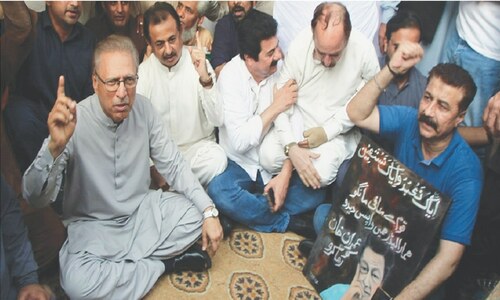
LAHORE: Trying to dispel what he described as a misperception, Justice Javed Iqbal of Supreme Court said on Saturday it was wrong to say the government was not implementing the directives of the apex court.
Speaking at a reception hosted in his honour by Punjab Bar Council here, he said only the media was talking about a confrontation between the judiciary and the executive.
Justice Iqbal also tried to “dispel the impression” that the Supreme Court wanted to run the country with the help of the army.
Justice Sheikh Azmat Saeed of Lahore High Court, vice-chairman of Punjab Bar Council Lehrasab Khan Gondal, chairman of the bar’s executive committee Zafar Mehmood Mughal and other senior lawyers were present on the occasion.
Justice Iqbal said the federal government had not defied any Supreme Court order. He, however, acknowledged that there was “an element of delay in implementing some court decisions”.
The parliament, being the creator of the Constitution, was supreme, he said. “But the Supreme Court is exercising its powers under the same Constitution.”
Justice Iqbal said both the judiciary and the parliament were bound by the Constitution to ensure rule of law and to root out corruption from society.
He said the country could not afford a clash between institutions and expressed the hope that none would take place.
He called for a system of self-accountability. “There won’t be a need for accountability laws if such a system is put in place,” he remarked.
Justice Iqbal, who would be retiring on Sunday, said the country’s judicial system needed to be reformed because the common man was still struggling to get justice.
He called upon all members of the legal fraternity to join hands in an effort to bring about the desired changes in the country’s judicial system.
Referring to the aggressive attitude of some young lawyers, Justice Iqbal advised them to be patient and to treat the courts with respect.
Answering a question, he reiterated that it was wrong to say the government had not implemented the Supreme Court verdicts.
In the NRO (National Reconciliation Ordinance) case, he said, the government had filed a review petition and the order could not be implemented until the petition was disposed of by the court.
In the Zafar Qureshi case, he said, the government had sought more time.
Justice Iqbal said the apex court did not want to issue any order that could harm the democratic dispensation in the country.
When asked whether or not the court could seek the army’s help in getting its orders implemented, he said the court did not feel the need for the military’s assistance because the government had been implementing its orders.
Answering another question, Justice Iqbal said through various judgments the court had ended the possibility of army rule in the country.
Even after his retirement, he said, he would continue to head the commission constituted to investigate the US raid of May 2.
He added that the report of the commission would be made public.













































Dear visitor, the comments section is undergoing an overhaul and will return soon.